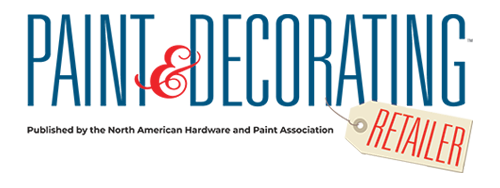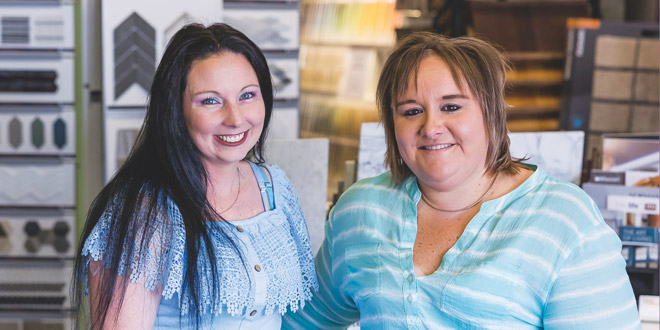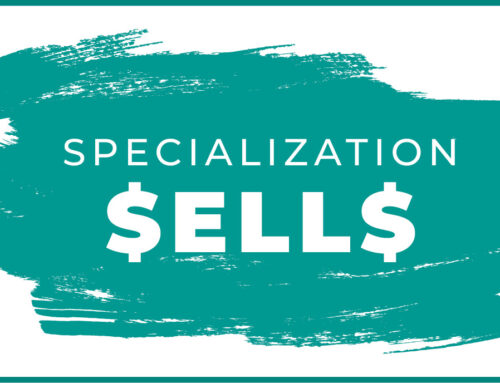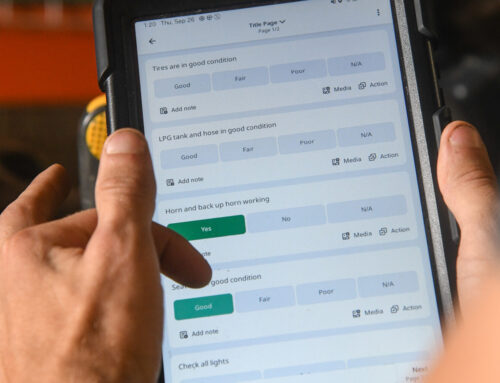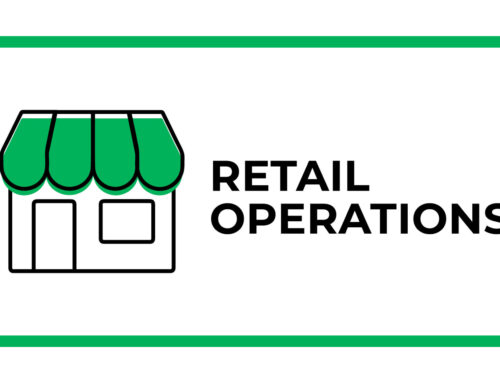Keeping up with retail technology trends is not for the faint of heart. From virtual dressing rooms to self-serve and cashierless stores to augmented shopping, technology has taken over retail. And it shows no signs of slowing down as consumers become more and more accustomed to experiencing technology during their shopping trips.
According to the Capgemini Research Institute Smart Store Report, 60% of consumers would prefer to shop in stores that use technology to make the experience more fun and engaging. Over 66% of consumers believe automation can improve their shopping experience by solving the challenges they face when they shop in retail stores.
While including technology in your business plans and budget is essential to thrive in the retail world, technology is not one-size-fits-all and should be curated toward your customers’ needs and your company’s capabilities.
Paint & Decorating Retailer explored the solutions that three retailers have implemented, sharing examples at three different levels, from programs any operation can implement to tech that seems lightyears in the future.
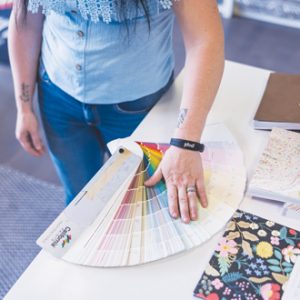 Entry-Level Technology
Entry-Level Technology
With an eye for what’s next, Nicole Durant strives to offer something different when customers visit her two stores in Exeter and Epping, New Hampshire. Over 20 years ago, Durant applied for a business loan at age 20 to purchase Exeter Paint Transform and Design, entering a world with few female paint store owners. Since that time she has established her business as the go-to place for contractors and DIYers and is continually looking to what’s next and how she can make her operation and customer service better.
Durant realized that offering cutting-edge and helpful technology doesn’t require breaking the budget. Just over three years ago, she was using a paint vendor’s e-commerce platform to serve customers online, but she decided to launch her own e-commerce site, with the help of a family member, to better serve her customers. She chose to host the site through Shopify, an e-commerce platform, because of its features and customer service.
When she was going through the process of implementing a new e-commerce site, Durant says she had several people tell her that her efforts weren’t worth it, especially for selling paint. She was told it wasn’t worthwhile for a paint and decorating retailer to put in the time and effort to launch and manage an e-commerce site at the caliber she wanted to elevate her site to.
“I disagreed. I felt if I really put my heart and soul into it and really worked hard on it, it could be another amazing stream of income, and it has been,” Durant says. “The first year posed some challenges as I learned the ropes of e-commerce, figured out keywords and SEO and put in hours setting up the site and maintaining it, but the effort has been worth it.”
The e-commerce site not only opened up an additional stream of income for the store, it solidified Exeter Paint Transform and Design’s reputation in the area and even internationally. The operation serves customers from all over the world and ships everything from paint to tile, solidifying Durant’s ability to provide everything needed for a full remodel.
“People don’t buy just products, they buy us, our customer service and our brand,” Durant says. “We’ve definitely shown our worth after 22 years in business. People come in every day for what we can provide to them—expert advice, products for the DIY customer and service to match.”
When a customer shops on the Exeter Paint Transform and Design website, they see pop-ups that show what products other customers have purchased and where customers are located around the world.
“Customers who are browsing see what other customers are buying, which really shows confidence to the consumer,” Durant says. “Buying paint and home improvement products online can be scary because people typically want to see and touch these items, so seeing that other people successfully purchase products from us is huge; they see the five-star reviews and then they see they can trust us.”
Other technology Durant has implemented is the Popl digital business card platform, a simple but effective solution that has boosted business and customer awareness.
Popl is a circular device that sticks to your checkout counter. When a customer wants the information of the store or any of your employees who they working with on a project, the customer simply taps their phone to the Popl device and it brings up the contact information, email address and even social media account information and that information is added to the contact list on their phone.
“All the customer has to do is hit ‘Save’ and the information is stored right in their phone; they don’t have to take the time to type it in,” Durant says.
The system also includes wristbands employees wear around the store that offer the same technology. A customer simply scans the QR code on the bracelet and can instantly save the store or employee’s contact information to their phone.
The enhanced e-commerce site and Popl device show customers that Exeter Paint Transform and Design is invested in technology and providing a high level of customer service.
“I want to be different from everybody else and offer what other paint stores, remodeling companies and retailers aren’t,” Durant says. “If you’re going to earn the business of the younger generation, you have to be on top of what’s new and what’s coming up.”
Mid-Range Technology
Eric Hassett, the owner of Hassett Hardware, has long been at the forefront of implementing new technologies in his operation of five stores in California. Hassett says technology is a frequent topic of conversation in his area, and he has always been interested in how it can improve efficiencies and benefit his employees and customers.
Most recently, Hassett brought in Theatro, a mobile communication platform he first discovered at the National Retail Federation NEXUS conference several years ago. While Hassett was interested in the Theatro technology, it wasn’t until fellow Ace Hardware retailer, Michael Wynn from Sunshine Ace in Florida, invited Hassett to see it in action that he was sold on implementing it at Hassett Hardware.
“When I saw it live, all of my initial hesitations I had when I first saw the technology were very much alleviated,” Hassett says. “Communication is one of our company’s four core values, and I saw immense value in this technology to be more efficient in our communications.”
Instead of using traditional radio signals, which have distance limitations, Theatro uses Wi-Fi communication, allowing Hassett Hardware staff to communicate with each other across all five locations. With radio communication, everyone hears every message, but Hassett says Theatro, which is a small headset device, cuts down on radio chatter because employees can message each other directly. It also allows employees to send messages to all employees or certain groups of employees, and it has functions for managers to leave messages, so when an employee puts on their headset in the morning, they can hear that day’s tasks or morning huddles from their managers.
Theatro can be utilized across multiple locations, allowing employees in each of Hassett’s stores to take advantage of the knowledge of a subject matter expert in another store.
“If I have my most junior paint person in one store and they have a question, they can radio directly to one of our paint experts in another store and get an answer right over the radio,” Hassett says.
Hassett says he can track who responds the fastest to messages sent through Theatro, as well as receive data on who is and isn’t responding when they need to be. This strategy allows him to “gamify” the process to encourage participation and reward employees.
“I want to reward the employees who are excelling at upholding our core values,” Hassett says. “This will be another tool for identifying those people who are putting the energy and effort into their jobs.”
Dream Technology
Every night at two of Busy Beaver Hardware locations, an autonomous robot roams the store, looking for misplaced and missing products. Adam Gunnett, director of information technology (IT) and marketing, heads up the technological projects for the operation, which has 25 stores in three states.
The automonous robot has been one of Gunnett’s biggest projects so far. Gunnett chose a local company, Badger Technologies, to partner with for the autonomous robot, which started the process by coming into the Delmont and Irwin stores and mapping out the floorplans and programming those blueprints into the robot. The company then brought the robot, which is equipped with several high-definition cameras and LED lights, to each store and made final tweaks on the path the robot follows.
“Once it was fine-tuned, it started doing a nightly scan of all the shelves,” Gunnett says. “It’s able to identify blank holes or the wrong product in a spot.”
Gunnett and the staff have access to a dashboard with the robot’s report from each night, which they use to fill in empty spaces, correct wrong prices and move products to where they belong.
“When we see an empty peg board, we can check if the product is back in the warehouse or if it’s empty because we’re waiting on a shipment, or if we need to take some other action on it,” he says.
Gunnett estimates the robot saves about 80 hours of employee time each week, completing its work in two hours each night. Along with increasing efficiencies, the robot has also improved employee morale.
“The robot isn’t replacing anyone’s job, but it’s doing the menial tasks so they are free to focus more on helping customers,” he says.
Gunnett says the goal of any technology solution is improving customer service.
“When people shop local, they’re giving us a chance, they are willing to maybe pay a little bit more or have to hop in their car to drive to us,” he says. “We want to make sure we’re taking care of them when they get there, and technology helps us accomplish that goal.”
The Future of Retail
Industry expert John Maiuri shares why technology is crucial for your operation here and watch the video from Busy Beaver Hardware.
